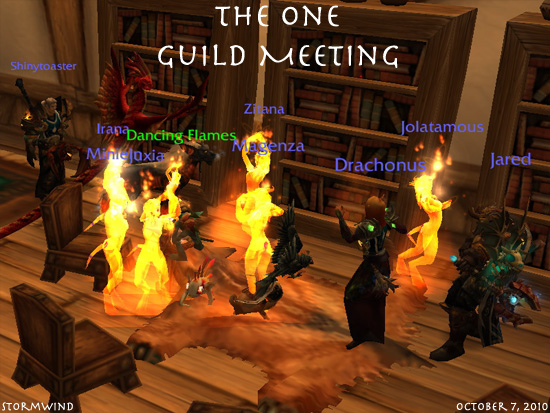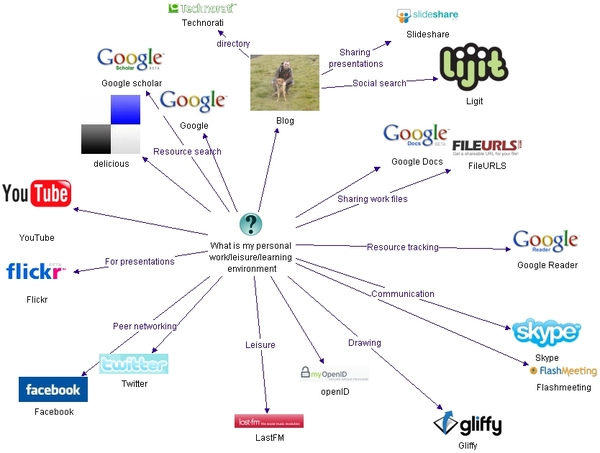These are some notes I made while at a meeting of Open University people interested in gaming, research, and learning on October 21, 2010. It was organized by Jo Iacovides (The Institute for Educational Technology) and Marian Petre (Computing). I received an invitation to attend early last month.
-
 2 comments
2 comments -

Credit: Michelle A. Hoyle Attribution-NonCommercial-ShareAlike 2.0 LicenseImage: A recent guild meeting where Irana (left) was initiated into The One. As always, there was dancing, but things got a little “hot.”
Colleagues from the Institute of Educational Technology (IET) and Maths, Computing and Technology at The Open University (OU) are inviting other OU staff interested in gaming research to a meeting next week in Milton Keynes. Here’s part of the blurb from the DigiLab post describing the event:
On Thursday, 21st October, Jo Iacovides (IET) and Marian Petre (Computing) are hosting an informal discussion on gaming research, with the aim of getting people from the OU who are interested in the area to meet up. Whether it’s using games for learning, considering game design, using gaming as a medium for understanding strategy or interaction, or anything else game-related, it would be great to hear from you.
As I’m interested in motivation, learning, and communities of practice formation within World of Warcraft, this is right up my alley. I know Jo Iacovides, one of the organizers, is also interested in some similar topics, as we’ve corresponded previously, but I’m eager to make some other connections. I doubt it will get as “heated” as some of my guild meetings, but it should be interesting.
PS: If anyone knows of cheap ways to get from Milton Keynes Central to The Open University, please let me know! I currently use the Raffles taxi service and it’s about £5.00 each way; the taxi fare is almost as much as my rail fare from London. Thanks.
-
I signed up today for the new George Siemens and Stephen Downes connectivism course Personal Learning Environments Networks and Knowledge 2010 (PLENK2010). This is a follow-on from last year’s massive online open course CCK09. I didn’t have much time last year for CCK09, but I did attend a few Elluminate sessions. In fact, that’s where I originated the concept of “Big OER” and “little OER” based on Martin Weller’s Pedagogy of Abundance presentation I attended as part of that course. I thought it would be interesting to lurk around the edges of the new course. The course’s description is:
In the last five years, the twin concepts of the personal learning environment (PLE) and personal learning network (PLN) have been offered as alternatives to more traditional environments such as the learning management system (LMS) and institutionally-based courses.
During that time, a substantial body of research has been produced by thinkers, technologists and practitioners in the field. Dozens of studies, reviews, conference presentations, concept papers and diagrams are now available.
The purpose of this course will be to clarify and substantiate, from the context of this new research, the concepts of personal learning environments and networks. Course facilitators and participants will analyze the research literature and evaluate it against their own experience with the intent of developing a comprehensive understanding of personal learning environments and networks.
Downes, Siemens, and Cormier (2010)The course just kicked off this week and the first topic involves social networks, personal learning networks, and personal learning environments. While I was reading through some of the postings on PLEs versus PLNs, it suddenly occurred to me that a massively online open course, especially one with this kind of structure, is not too dissimilar to the learning that occurs in MMORPGs. In fact, I’d argue that good game players need to construct their own personal learning networks in order to understand the game and improve their playing. They’re both about social construction of knowledge.
I think a great idea for a paper is contrasting the formal and informal learning networks people build in an MOOC like PLENK2010 and in MMORPGs. It could even be fleshed out with some interviews with 4 or 5 players about how/what they use during the course of game playing. I envision it should be possible to construct some GPLN (game player learning network) diagrams similar to the PLN diagrams that Scott Leslie collected. Here, for example, is Martin Weller’s PLN:

I could make a similar diagram for myself, but with a specific game-playing focus. I’m sure I could easily entice some other, more hard-core players, to make similar diagrams, if not as actual graphics at least as a list. I really think there is something here. The key point though is, even if there is, what does it mean if there is a similarity? That I don’t know. Any ideas?
Downes, S., Siemens, G. & Cormier, D. (2010) Personal Learning Environments Networks and Knowledge ~ PLENK 2010, [online] web site. Available from: http://connect.downes.ca/
-
Credit EduGlu-y JosieFraser for this posting on the seven degrees of Ein or things you probably never knew (and perhaps could have lived without) based on the Twitter meme currently making the rounds. If you’d like to participate and haven’t been tagged, the rules are quoted below:
Kind of like high 5, but not. Thank you Mark Hawker for memeing me, & posting the rules (although feeling a bit Déjà vu on this one, wondering if black holes are really just meme collisions):
* Link your original tagger(s), and list these rules on your blog.
* Share seven facts about yourself in the post – some random, some weird.
* Tag seven people at the end of your post by leaving their names and the links to their blogs.
* Let them know they’ve been tagged by leaving a comment on their blogs and/or Twitter.[From SocialTech: Random 7]
Now, on to the 7º of Ein!







